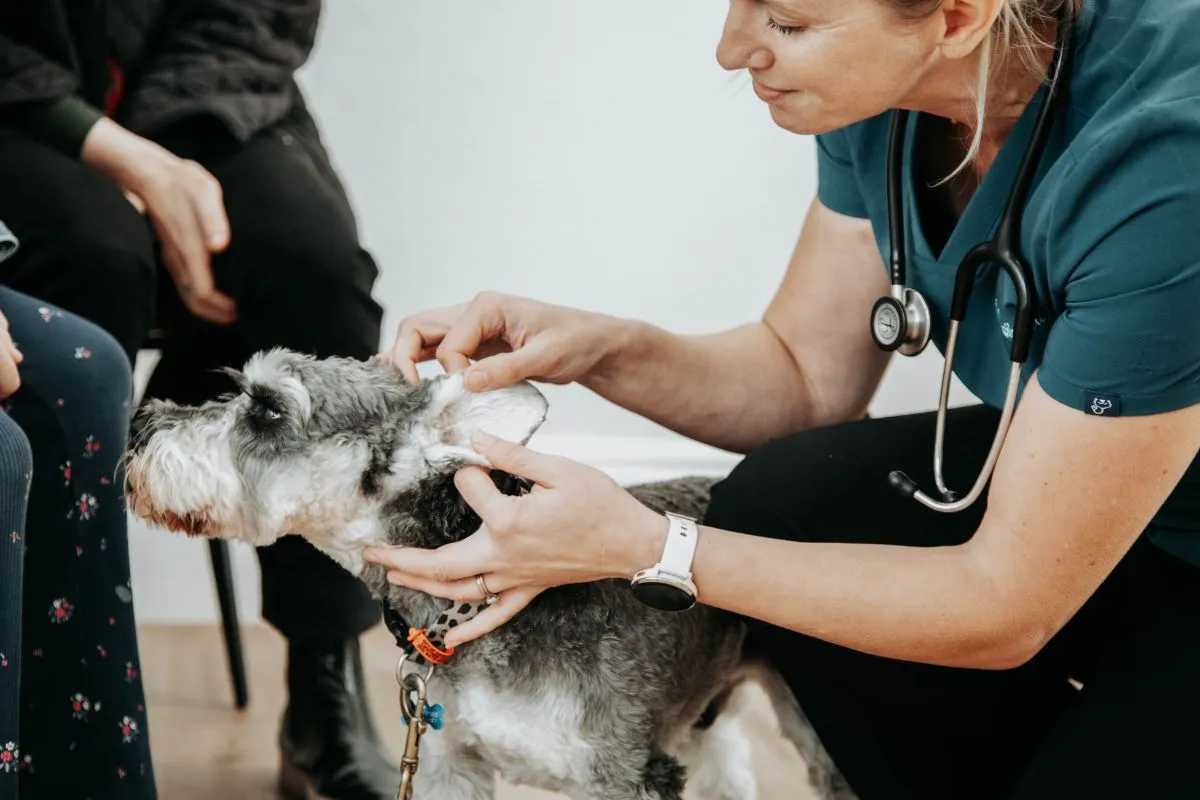Spring in Melbourne is a beautiful time to enjoy warmer weather, blossoming flowers, and longer walks with your dog.
For many pets (and their owners), spring also means dog allergies…
Signs Your Dog May Be Suffering With An Allergy
Some of the most common symptoms we see in Melbourne dogs during spring include:
- Itchy skin - commonly the “underneath areas” - feet, tummy, chest, armpits, groin, inner thighs and bottom
- Itchy ears and recurrent ear infections
- Sneezing, reverse sneezing, watery or itchy eyes

Why Dog Allergies Are So Common in Melbourne
Melbourne is known for its “four seasons in a day” weather, but this also means fluctuating pollen counts and bursts of grass growth in spring.
This, together with our large open spaces and temperate climate, Melbourne is considered to be the “allergy capital of the world” in people and dogs share a similar story!
Types Of Dog Allergies In Spring Include:
- Environmental allergies - pollen, dust, plants, moulds
- Flea allergic dermatitis - allergy to the saliva in flea bites
- Contact allergy - a reaction to contact with particular plants or weeds. Wandering Trad (previously Wandering Jew) is a common culprit

Diagnosing Your Dogs Allergy
Allergies in dogs are extremely common, and one of the most frequent conditions we see at Northside Vets.
Allergies are diagnosed based on your dog’s current and previous symptoms and by ruling out other causes of itch such as thyroid imbalance or infections.
We may take a sample of skin, hair or ear “dirt” to examine under the microscope to look for mites, yeast and bacteria. Knowing your dog’s previous medical history, diet and pattern of symptoms will be useful information to bring to the consult.

Treatment Options for Dog Allergies
Treating your pets symptoms is important as constant itchy ears and skin can significantly impact their quality of life. Managing allergies in dogs long term can be frustrating as they usually need some sort of treatment or management for life.
The good news is, there are several ways to help relieve their symptoms and reduce future flare ups:
- Reduce the itch - there are medications we can prescribe or administer to quickly relieve their itch. These can be used short term, or long term if needed
- Improve skin health - healthier skin = stronger barrier to withstand allergens. Enriching your dogs diet with omegas 3+6, hypoallergenic shampoos and topical treatments can help significantly
- Controlling infections - flea prevention is vital even if your dog isn’t allergic to fleas - a single bite on already irritated skin will trigger their itching ten-fold. Secondary bacterial and yeast infections are common in allergic skin disease, these too will make itching worse and need to be kept under control
- Reduce exposure - identify and remove potentially irritating plants in your dogs environment such as Wandering Trad. Rinse off tummy and paws after a walk to remove pollens from the skin. Reduce house dust and keep their bedding clean.

Case Study: Rocky the Cavoodle
We recently treated Rocky, a 2 year old Cavoodle. Rocky had suffered a few ear infections in the past and more recently had been constantly scratching his belly and chewing his paws. The skin on his belly and “armpits” was red and inflamed, and he was miserable.
After a thorough examination, we diagnosed a seasonal allergy triggered by the spring pollen. This type of dog allergy is called Atopic Dermatitis.
We gave him an injection to immediately relieve his itch and to allow him (and his owners!) to get some rest. We started him on tablets to control his itch over the next few weeks, and a medicated shampoo to soothe his skin. We also introduced a hypoallergenic diet made specifically for dogs with skin allergies.
His itch subsided within a few hours, and has stayed away. His skin is healthier and he is back to his usual cheeky self! The combination of the medicated shampoo and the right diet will hopefully be enough to keep his allergy symptoms away long term, with the help of the itch medication when needed.
Common Questions About Dog Allergies
Can a dog get rid of allergies completely?
Allergies in dogs are often genetic, meaning they were born with the potential for allergies and this cannot be changed. Dogs do not “grow out” of allergies and they cannot be cured.
However with the correct diet, and often simple preventative treatments, the symptoms of their allergies can be completely controlled.
Do all dogs get allergies?
No. As with people, some dogs are born with the potential for allergies and some are not. Even pups from the same litter will be different - some will grow up to have allergies and some won’t
Do dog allergies get worse with age?
Symptoms of allergies start between 6 months and three years old. They can get worse with age if they aren’t well controlled as the skin can become damaged long term, making it more susceptible to flare ups.
Allergies can change if a dog moves to an area with increased pollen or if their diet changes
Can I give my dog hayfever and allergy relief tablets?
Human anti-histamines are generally safe for dogs, however they are not usually effective.
Unlike humans, dog allergies do not involve histamine so anti-histamines are not effective at reducing their itch
How to stop my dog from itching allergies?
We can prescribe or administer medication that quickly and effectively reduces their itch. Depending on your dog’s type of allergy we can recommend ways of keeping their itch under control long term
When should I see a vet?
Your dog will benefit from a vet visit if you notice:
- Your dog is scratching, rubbing or licking their skin
- Shaking their head or scratching at their ears
- Red or raised skin, patches of hair loss
- Smell from their skin or ears

Keep Your Dog Happy and Allergy-Free This Season
Spring in Melbourne doesn’t have to mean months of discomfort for your dog. With the right care and advice, you can help ease their symptoms and enjoy the season together.
Call our team for a consultation today and give your pup the comfort and relief they deserve.



